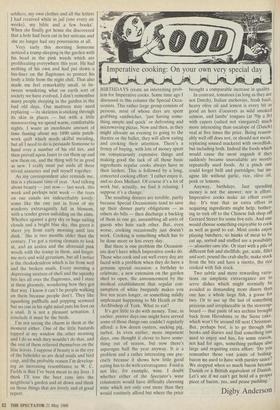BIRTHDAYS create an interesting prob- lem for Imperative cooks. Some
time ago I discussed in this column the Special Occa- sionists. This rather large group consists of persons, most of whose days are spent grabbing sandwiches, 'just having some- thing simple and quick' or defrosting and microwaving pizzas. Now and then, as they might allocate an evening to going to the theatre or the ballet, they will allow eating and cooking their attention. There's a frenzy of buying, with lots of money spent on conspicuously expensive things and making good the lack of all those basic ingredients regular cooks always have in their larders. This is followed by a long, concerted cooking effort: 'I rather enjoy it, and so does Michael. Of course it's a lot of work but, actually, we find it relaxing. I suppose it's a change.'
The resulting dinners are terrible, partly because Special Occasionists tend to save up their dinner party obligations — as others do bills — then discharge a backlog of them in one go, asssembling all sorts of guests who hate each other. But, even worse, cooking occasionally just doesn't work. Cooking is something which has to be done more or less every day.
But there is one problem the Occasion- ists don't have which Imperative cooks do. Those who cook and eat well every day are faced with a problem when they do have a genuine special occasion: a birthday to celebrate, a new extension on the garden shed to open, the announcement by the medical establishment that regular con- sumption of white burgundy makes you live ten years longer, or something mildly unpleasant happening to Mr Heath or the Archbishop of York. What to eat?
It's got little to do with money. True, in earlier, poorer days one might have served some of those things one couldn't regularly afford: a few dozen oysters, sucking pig, turbot. In even earlier, more impatient days, one thought it clever to have some- thing out of season, but now there's asparagus half the year anyway. It is a problem and a rather interesting one pre- cisely because it shows how little good eating has to do with extravagance. Food is not like, for example, wine. I doubt whether either of the Spectator's wine columnists would have difficulty choosing wine which not only cost more than they would routinely afford but where the price
brought a comparable increase in quality.
In contrast, tomatoes (as long as they are not Dutch), Italian anchovies, fresh basil, heavy olive oil and lemon is every bit as good an hors d'oeuvres as wild smoked salmon, and lambs' tongues (at 70p a lb) with capers (salted not vinegared) much more interesting than escalope of (Dutch) veal at five times the price. Being reason- ably well off does not, or should not mean, replacing soused mackerel with swordfish, but including both. Indeed the foods which would cause the most anguish if they suddenly became unavailable are mostly repeatedly used foods. At a pinch one could forget brill and partridges; but im- agine life without garlic, rice, olive oil, pork or lemons.
Anyway, birthdays. Just spending money is not the answer; nor is effort. Imperative cooks make an effort every day. It's true that an extra effort in acquiring ingredients might help, bother- ing to trek off to the Chinese fish shop off Gerrard Street for some live eels. And one would choose something enjoyable to cook as well as good to eat. Most cooks enjoy playing butchers, so hunks of meat to be cut up, sorted and stuffed are a possibility — alouettes sans tete. Or start with a pile of different fish and shellfish; gut, scale, fillet and sort; pound the crab shells; make stock from the bits and have a risotto, the rice cooked with fish stock.
Two subtle and more rewarding varia- tions on simplistic extravagance are to serve dishes which might normally be avoided as demanding more diners than one has: a whole large fish, a goose for two. Or to use up the last of something precious and irreplaceable in the storecup- board — that paste of sea urchins brought back from Hiroshima or the Siena cake, which won't be around till next Christmas. But, perhaps best, is to go through the books and diaries and find something One used to enjoy and has, for some reason, not had for ages, something perhaps also large and requiring extra effort: 'Do yon remember those vast joints of boiling- bacon we used to have with parsley sauce? We stopped when so much bacon became Danish or a British equivalent of Danish. Let's see if we can't get hold of a proper piece of bacon, yes, and pease pudding.
Digby Anderson






























































 Previous page
Previous page